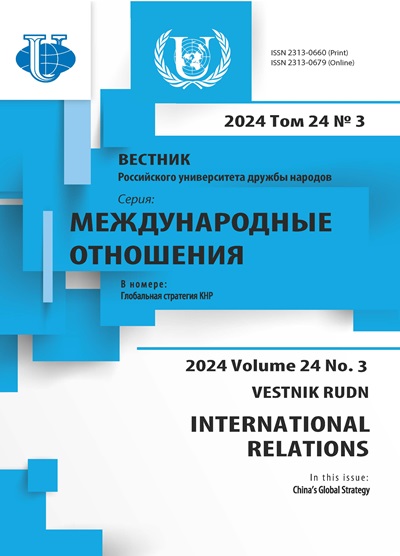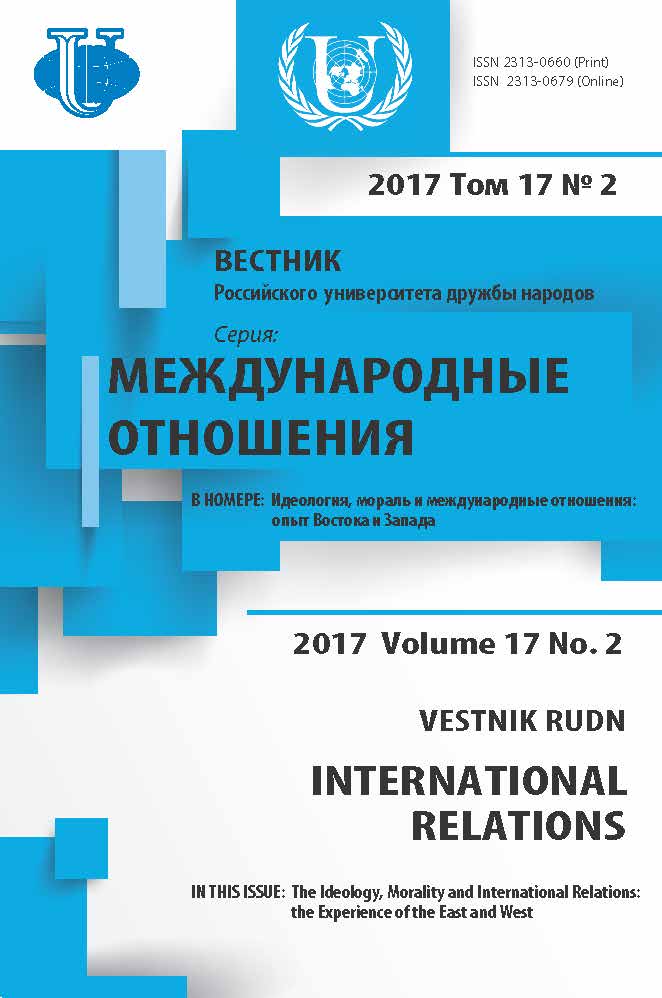Внешнеполитическая программа Октябрьской революции: истоки и результат
- Авторы: Ланцов С.А.1, Ланцова И.С.1
-
Учреждения:
- Санкт-Петербургский государственный университет
- Выпуск: Том 17, № 2 (2017): Идеология, мораль и международные отношения: опыт Востока и Запада
- Страницы: 233-245
- Раздел: ТЕМАТИЧЕСКОЕ ДОСЬЕ
- URL: https://journals.rudn.ru/international-relations/article/view/16059
- DOI: https://doi.org/10.22363/2313-0660-2017-17-2-233-245
Цитировать
Полный текст
Аннотация
В статье анализируются идейные истоки советской внешнеполитической практики после победы Октябрьской революции 1917 г. Отмечается, что у марксистской и либеральной концепций международной политики имелись общие корни, что предопределило схожесть предложений о мирном урегулировании, выдвинутых после Октябрьской революции русскими большевиками и соответствующими предложениями президента США В. Вильсона. В статье обращается внимание на то, что лидеры Октябрьской революции изначально рассматривали ее как составную часть мировой революции. Поэтому надежда на успех мировой революции стала фактором, определившим как внутреннюю, так и внешнюю политику Советской России. В статье отмечается, что ленинская концепция мировой революции предполагала тесную связь рабочего движения с национально-освободительными движениями в колониальных и полуколониальных странах. Такое сотрудничество стало важным направлением советской внешней политики, хотя в разные периоды советской истории степень внимания к национально-освободительным движениям была неодинаковой и зависела от внешнеполитической ситуации, в которой находился Советский Союз. Вместе с тем указывается, что при всей противоречивости внешней политики СССР, которая была обусловлена как идеологическими, так и геополитическими факторами, в ней всегда присутствовала готовность поддерживать принцип национального самоопределения, что фактически осталось в наследство от внешнеполитической платформы Октябрьской революции. В результате СССР внес существенный вклад в ликвидацию колониальной системы и тем самым способствовал изменению характера мировой политики и международных отношений в XX в.
Об авторах
Сергей Алексеевич Ланцов
Санкт-Петербургский государственный университет
Автор, ответственный за переписку.
Email: s_lantsov@mail.ru
Санкт-Петербург, Россия
Ирина Сергеевна Ланцова
Санкт-Петербургский государственный университет
Email: islanko@mail.ru
Санкт-Петербург, Россия
Список литературы
- Валлерстайн И. Анализ мировых систем и ситуация в современном мире / Пер. с англ. П.М. Кудюкина; Под ред. Б.Ю. Кагарлицкого. СПб.: Университетская книга; 2001
- Всемирная история: В 24 т. Т. 19: Первая мировая война / А.Н. Бадак, И.Е. Войнич, Н.М. Волчек и др. Минск: Литература; 1997
- Информационное совещание представителей некоторых компартий в Польше в конце сентября 1947 года. М.: Госполитиздат; 1948
- Капченко Н. Внешнеполитическая концепция Сталина // Международная жизнь. 2005. № 9. С. 100-121
- Ланцов С.А. Внешнеполитическая стратегия СССР накануне и в начальный период Второй мировой войны: геополитические и идеологические факторы // Вестник СПбГУ. Серия 6. 2015. Вып. 3. С. 4-14
- Ленин В.И. IX Всероссийский съезд советов. 23-28 декабря 1921 г. // Полное собрание сочинений. 5-е изд. М.: Политиздат; 1970a. Т. 44. С. 289-338
- Ленин В.И. Доклад о тактике РКП 5 июля // Полное собрание сочинений. 5-е изд. М.: Политиздат; 1970b. Т. 44. С. 34-55
- Ленин В.И. Итоги дискуссии о самоопределении // Полное собрание сочинений. 5-е изд. М.: Политиздат; 1973a. Т. 30. С. 17-58
- Ленин В.И. Крах II Интернационала // Полное собрание сочинений. 5-е изд. М.: Политиздат; 1969a. Т. 26. С. 209-265
- Ленин В.И. Критические заметки по национальному вопросу // Полное собрание сочинений. 5-е изд. М.: Политиздат; 1973b. Т. 24. С. 113-150
- Ленин В.И. О задачах пролетариата в данной революции // Полное собрание сочинений. 5-е изд. М.: Политиздат; 1969b. Т. 31. С. 113-118
- Ленин В.И. О карикатуре на марксизм и об «империалистическом экономизме» // Полное собрание сочинений. 5-е изд. М.: Политиздат; 1973c. Т. 30. С. 77-130
- Ленин В.И. О лозунге Соединенных Штатов Европы // Полное собрание сочинений. 5-е изд. М.: Политиздат; 1969c. Т. 26. С. 351-355
- Ленин В.И. О праве наций на самоопределение // Полное собрание сочинений. 5-е изд. М.: Политиздат; 1969d. Т. 25. С. 255-320
- Ленин В.И. Социальное значение сербско-болгарских побед // Полное собрание сочинений. 5-е изд. М.: Политиздат; 1968. Т. 22. С. 186-188
- Ли Вл.Ф. Россия и Корея в геополитике евразийского Востока (XX век). М.: Научная книга; 2000
- Маркс К. Запись речи К. Маркса об отношении Международного Товарищества Рабочих к конгрессу Лиги мира и свободы // Маркс К., Энгельс Ф. Соч. 2-е изд. М.: Политиздат; 1960a. Т. 16. С. 556-557
- Маркс К. Учредительный манифест Международного Товарищества Рабочих // Маркс К., Энгельс Ф. Соч., 2 изд-е. М.: Политиздат; 1960b. Т. 16. С. 3-11
- Маркс К., Энгельс Ф. Манифест Коммунистической партии // Маркс К., Энгельс Ф. Соч. 2-е изд. М.: Политиздат; 1955. Т. 4. С. 419-459
- Троцкий Л.Д. Коммунистический интернационал после Ленина (Великий организатор поражений). М.: Спартаковец, АО Принтима; 1991
- Энгельс Ф. Письмо Карлу Каутскому в Вену. 12 сентября 1882 года // Маркс К., Энгельс Ф. Соч. 2-е изд. М.: Политиздат; 1964. Т. 35. С. 297
- Энгельс Ф. Письмо Карлу Каутскому в Вену. 20 февраля 1889 года // Маркс К., Энгельс Ф. Соч. 2-е изд. М.: Политиздат; 1961. Т. 37. С. 5-6
- Энгельс Ф. Принципы коммунизма // Маркс К., Энгельс Ф. Соч. 2-е изд. М.: Политиздат; 1955. Т. 4. С. 322-339
- Gaddis J.L. We Now Know: Rethinking Cold War History. N.Y.; 1997
- Stoessinger J.G. The Might of Nations. World Politics in Our Time. N.Y.: Random House; 1986
- Wallerstein I. The cold war and the Third World: The good old days? Binghamton (N.Y.): Fernand Braudel Center for the study of economies, hist. systems and civilizations; 1990
- Wallerstein I. The concept of national development, 1917-1989: Elegy and Requiem. Binghamton (N.Y.): Fernand Braudel Center for the study of economies, hist. systems an civilizations; 1991











